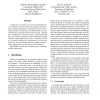Free Online Productivity Tools
i2Speak
i2Symbol
i2OCR
iTex2Img
iWeb2Print
iWeb2Shot
i2Type
iPdf2Split
iPdf2Merge
i2Bopomofo
i2Arabic
i2Style
i2Image
i2PDF
iLatex2Rtf
Sci2ools
100
click to vote
IPPS
2000
IEEE
2000
IEEE
Improving Throughput and Utilization in Parallel Machines through Concurrent Gang
In this paper we propose a new class of scheduling policies, dubbed Concurrent Gang, that combines the advantages of gang scheduling for communication and synchronization intensive parallel jobs with the flexibility of a Unix scheduler for sequential and I/O intensive jobs. Besides that, scalability in Concurrent Gang is achieved through the use of a global synchronizer that coordinates the gang scheduler among different processors. Simulation results are provided comparing the performance of Concurrent Gang with Gang Scheduling and show significant performance improvements, in particular for I/O bound jobs. Key Words: Parallel job scheduling, gang scheduling, parallel computation
Related Content
| Added | 31 Jul 2010 |
| Updated | 31 Jul 2010 |
| Type | Conference |
| Year | 2000 |
| Where | IPPS |
| Authors | Fabrício Alves Barbosa da Silva, Isaac D. Scherson |
Comments (0)

